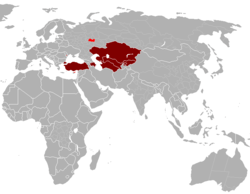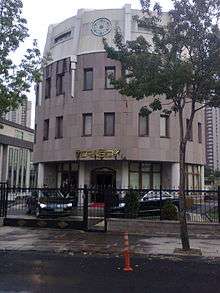International Organization of Turkic Culture
The International Organization of Turkic Culture (Turkish: Uluslararası Türk Kültürü Teşkilatı, Türksoy) is an international cultural organization of countries with Turkic populations, speaking languages belonging to the Turkic language family. Other than being an abbreviation of the former official name Türk Kültür ve Sanatları Ortak Yönetimi ('Joint Administration of Turkic Culture and Arts'), Türksoy is also a compound noun in Turkish, made up of the words Türk (Turk/ic) and soy (ancestry).
International Organization of Turkic Culture Uluslararası Türk Kültürü Teşkilatı (Türksoy) | |
|---|---|
 Sovereign (maroon) and other members (red) of Türksoy | |
| Headquarters | |
| Official language | Turkish (official language) Russian, English (working languages) |
| Members[1] |
|
| Leaders | |
• General Secretary | Dusen Kaseinov |
| Establishment | 1993 |
Website https://www.turksoy.org | |
The General Secretary of Türksoy is Duisen Kaseinov, former Minister of Culture of Kazakhstan. Türksoy has its headquarters in Ankara, Turkey.
History
The organization has its roots in meetings during 1992 in Baku and Istanbul, where the ministers of culture from Azerbaijan, Kazakhstan, Kyrgyzstan, Uzbekistan, Turkey, and Turkmenistan declared their commitment to cooperate in a joint cultural framework. Türksoy was subsequently established by an agreement signed on July 12, 1993 in Almaty.
In 1996, an official cooperation between Türksoy and UNESCO was established, involving mutual consultations and reciprocal representation.[2]
It is announced that Türksoy will be integrated into the Turkic Council, a geopolitical organization of Turkic countries established on November 3, 2009.
Members
As of 2016, Türksoy has six sovereign member states and three non-sovereign observer states.[1]
| Member state | Language | Notes |
|---|---|---|
| Azerbaijani | ||
| Kazakh | ||
| Kyrgyz | ||
| Turkish | ||
| Turkmen | ||
| Uzbek | ||
| Observer state | Language | Notes |
| Bashkir | a federal subject of Russia. | |
| Tatar | a federal subject of Russia. | |
| Gagauz | an autonomous region of Moldova. | |
| Turkish | a de facto independent republic recognized only by Turkey; see Cyprus dispute. | |
Past members
The five Russian federal subjects left Türksoy after a Russian aircraft was shot down by Turkish forces in late 2015.[3][4][5]
| Observer state | Language | Notes |
|---|---|---|
| Altay | a federal subject of Russia. | |
| Khakas | a federal subject of Russia. | |
| Sakha (Yakut) | a federal subject of Russia. | |
| Tuvan | a federal subject of Russia. |

Past and Future Population
- List of countries by past and future population provide 1950, 2000 and 2050 population while the 2100 data is from the United Nations medium fertility variant projection.
| Rank | Country | Area | 1950 | 2000 | 2050 | 2100 |
|---|---|---|---|---|---|---|
| 1 | 783,562 | 21,122,000 | 65,970,000 | 89,291,000 | 87,983,000 | |
| 2 | 447,400 | 6,293,000 | 25,042,000 | 35,117,000 | 32,077,000 | |
| 3 | 2,724,900 | 6,694,000 | 15,688,000 | 22,238,000 | 24,712,000 | |
| 4 | 86,600 | 2,886,000 | 8,464,000 | 11,210,000 | 9,636,000 | |
| 5 | 199,900 | 1,739,000 | 4,938,000 | 7,064,000 | 9,046,000 | |
| 6 | 488,100 | 1,205,000 | 4,386,000 | 6,608,000 | 5,606,000 | |
| Total | 4,730,462 | 39,939,000 | 124,488,000 | 171,528,000 | 169,060,000 | |
Land and Water Area (Exclude Caspian Sea)
This list includes dependent territories within their sovereign states (including uninhabited territories), but does not include claims on Antarctica. EEZ+TIA is exclusive economic zone (EEZ) plus total internal area (TIA) which includes land and internal waters.
| Rank | Country | Area | EEZ | Shelf | EEZ+TIA |
|---|---|---|---|---|---|
| 1 | 783,562 | 261,654 | 56,093 | 1,045,216 | |
| 2 | 447,400 | 0 | 0 | 447,400 | |
| 3 | 2,724,900 | 0 | 0 | 2,724,900 | |
| 4 | 86,600 | 0 | 0 | 86,600 | |
| 5 | 199,900 | 0 | 0 | 199,900 | |
| 6 | 488,100 | 0 | 0 | 488,100 | |
| Total | 4,730,462 | 261,654 | 56,093 | 4,992,116 | |
Activities
Türksoy carries out activities to strengthen cultural ties between Turkic peoples. One of the main goals to transmit their common cultural heritage to future generations and promote it around the world.[6]
Activities and events include;[6]
- Gatherings of artists, photographers, painters, opera singers, poets, journalists, theatre, dance and music ensembles of the Turkic World.
- Monthly journal published in three languages,
- Works written in various languages and Turkic dialects.
- Commemoration of artists, authors, poets and scholars in recognition of their valuable contribution to Turkic culture
- Symposia and conferences covering topics on the common history, language, culture and art of Turkic peoples
- Nevruz Day celebrations including concerts and events held in the UNESCO Headquarters in 2010, the United Nations General Assembly Hall in 2011, and various other countries including Germany, Austria and the UK
- Nevruz festival held on April 1, 2016 at Warner Theater in Washington DC[7]
Cultural Capital of the Turkic World
Every year, one city in the Turkic world is selected as the "Cultural Capital of the Turkic World". Within the framework of events to celebrate the Cultural Capital of the Turkic World, numerous cultural events are held, gathering artists, scholars and intellectuals, giving them the opportunity to exchange their experiences, as well as promoting the city in question internationally.[8]
Recent cities that have been awarded this title are;[6]
- 2012: Nursultan (as formerly Astana) in Kazakhstan
- 2013: Eskişehir, in Turkey
- 2014: Kazan in Tatarstan
- 2015: Merv in Turkmenistan
- 2016: Shaki, Azerbaijan[8]
- 2017: Turkistan, in Kazakhstan
- 2018: Kastamonu, in Turkey[9]
- 2019: Osh, in Kyrgyzstan
- 2020: Khiva, in Uzbekistan[10]
Year of
| Year | Year of | Notes |
|---|---|---|
| 2010 | Zeki Velidi Togan[11] | Bashkir historian |
| 2011 | Ğabdulla Tuqay[12] | Tatar poet |
| 2012 | Nikolai Katanov (az)[13] | Khakas Turkolog |
| 2013 | Mukan Tulebaev (tr)[14] | Kazakh musician |
| 2014 | Magtymguly Pyragy and Toktogul Satylganov[15] | Turkmen poet / Kyrgyz poet |
| 2015 | Haldun Taner and Semen Kadışev (ru)[16] | Turkish writer / Khakas dastan writer |
| 2016 | Yūsuf Balasaguni[17] | Turkic philosopher and poet |
| 2017 | Molla Panah Vagif[18] | Azerbaijani poet |
| 2018 | Gara Garayev, Magzhan Zhumabayev and Chinghiz Aitmatov[19] | Azerbaijani composer / Kazakh poet / Kyrgyz writer |
| 2019 | Imadaddin Nasimi and Âşık Veysel[20] | Azerbaijani poet / Turkish folk singer |
| 2020 | Abai Qunanbaiuly[21] | Kazakh poet and intellectual |
Funding
Türksoy is funded by contributions paid by individual member states, local governments, universities and NGOs.[6]
References
- Türksoy Official Web Site (2009). "Homepage > Türksoy > Member States". Archived from the original on 2012-12-22. Retrieved 2009-12-04.
- UNESCO Web Site (1996). "Relations with the Joint Administration of the Turkic Culture and Arts (TÜRKSOY), and Draft Agreement between that Organization and UNESCO" (PDF). Archived (PDF) from the original on 2016-03-03. Retrieved 2009-12-04.
- "Якутия поддерживает политику России по отношению к Турции | NVK Online". nvk-online.ru. Archived from the original on 2016-02-02. Retrieved 2016-01-30.
- "Якутия прервет связи с ТюрКСОЙ: "Партнеров в тюркском мире достаточно" - ИА REGNUM". ИА REGNUM. Archived from the original on 2016-02-03. Retrieved 2016-01-30.
- "Власти тюркских регионов выбирают между Россией и Турцией". Archived from the original on 2017-04-08. Retrieved 2017-04-02.
- POLAT, Orhan. "About :: TURKSOY". www.turksoy.org. Archived from the original on 2016-04-24. Retrieved 2016-05-17.
- "NEVRUZ CELEBRATIONS OF TURKSOY 2016". www.turksoy.org. Archived from the original on 2016-04-04. Retrieved 2017-07-27.
- POLAT, Orhan. "Cultural Capital of the Turkic World 2016: Sheki :: TURKSOY". www.turksoy.org. Archived from the original on 2016-06-01. Retrieved 2016-05-17.
- POLAT, Orhan. "The Cultural Capital of the Turkic World 2018: Kastamonu :: TURKSOY". www.turksoy.org. Archived from the original on 2017-12-15. Retrieved 2017-12-15.
- "Archived copy". Archived from the original on 2019-12-06. Retrieved 2019-12-06.CS1 maint: archived copy as title (link)
- "2010 Ahmet Zeki Velidi Togan Yılı :: TÜRKSOY". www.turksoy.org. Archived from the original on 10 November 2019. Retrieved 10 November 2019.
- "TÜRKSOY 27.Dönem Bakanlar Konseyi Toplantısı'nda Önemli Kararlara İmza Atıldı :: TÜRKSOY". www.turksoy.org. Archived from the original on 10 November 2019. Retrieved 10 November 2019.
- "TÜRKSOY Türk Dünyasını Astana'da Buluşturdu :: TÜRKSOY". www.turksoy.org. Archived from the original on 10 November 2019. Retrieved 10 November 2019.
- "2013 MUKAN TÖLEBAYEV YILI :: TÜRKSOY". www.turksoy.org. Archived from the original on 10 November 2019. Retrieved 10 November 2019.
- "TÜRKSOY Daimi Konseyi 31. Dönem Toplantısı ve TÜRKSOY'un 20. Kuruluş Yıldönümü Kutlamaları Sonuç Bildirisi :: TÜRKSOY". www.turksoy.org. Archived from the original on 10 November 2019. Retrieved 10 November 2019.
- "32. DÖNEM TÜRKSOY DAİMİ KONSEYİ SONA ERDİ :: TÜRKSOY". www.turksoy.org. Archived from the original on 10 November 2019. Retrieved 10 November 2019.
- "Türk Dili konuşan ülkeler Kültür Bakanları Daimi Konseyi 33. Dönem Toplantısı, 2015 Türk Dünyası Kültür Başkenti Merv'de yapıldı :: TÜRKSOY". www.turksoy.org. Archived from the original on 10 November 2019. Retrieved 10 November 2019.
- "Azerbaycan'da Büyük Buluşma - TURKSOY Daimi Konseyi 34. Toplantısı :: TÜRKSOY". www.turksoy.org. Archived from the original on 10 November 2019. Retrieved 10 November 2019.
- "Kültür Bakanları Türkistan'da Bir Araya Geldi :: TÜRKSOY". www.turksoy.org. Archived from the original on 10 November 2019. Retrieved 10 November 2019.
- "TÜRKSOY Daimi Konseyi 36. Dönem Toplantısı Kastamonu'da Yapıldı :: TÜRKSOY". www.turksoy.org. Archived from the original on 10 November 2019. Retrieved 10 November 2019.
- "TÜRKSOY Daimi Konseyi Oş'ta Toplandı. :: TÜRKSOY". www.turksoy.org. Archived from the original on 14 December 2019. Retrieved 14 December 2019.
External links
| Wikimedia Commons has media related to TÜRKSOY. |
- (in Turkish, English, and Russian) Türksoy Website